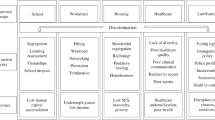Abstract
In a pluralistic society it is important that patients and health care operators be aware of each others’ beliefs and values. A value history allows the practitioners to identify the patients’ goals and desires and to provide a care congruent with these aims. In this respect the scope of a value history goes much beyond than its original intention to probe a practitioner’s standing on controversial issues such as abortion and euthanasia.. The case of Peggy Sue illustrates how the failure to take a value history may result in medically sound but humanly devastating medical treatment.
Similar content being viewed by others
References
Justin RG (1987) The value history. A necessary family document. Theor med 3:275–282
Newcomb M, Balduc Ci L, Thigpen JT et al (1978) Acute leukemia and pregnancy. Successful delivery after cytarabine and doxorubicin. JAMA 239:2961–2962
Amant F, Han SN, Giziri MM et al (2012) Chemotherapy during pregnancy. Curr Opin Oncol 24:580–586
Surbone A, Baider L (2013) Personal values and cultural diversity. JMP 11. doi:10.1007/s12682-013-0143-4
Bertakis KD, Azari R (2012) Patient-centered care: the role pf patient and resident physician gender and gender concordance in primary care. J Women Health 21:326–333
Balducci L (2008) And a time to die. JMP 6:99–103
Niebroj L, Bargiel Matusiewicz K, Wilczynska A (2013) Toward the clarification of ideas: medical futility, persistent and obstinate care and extraordinary means. Adv Exp Med Biol 755:349–356
Jox RH, Schalder A, Marckman G et al (2012) Medical futility at the end of life: the perspectives of intensive care and palliative care physicians. J Med Ethics 38:540–545
Terra SM, Powell SK (2012) Is a determination of medical futility ethical? Prof case Manag 17:103–106
Samuel A (1996) The advance directive (or living will). Med Sci Law 36:2–8
Temel JS, Greer JA, Muzikansky A et al (2010) Early palliative care for patients with metastatic non small cell lung cancer. N Engl J Med 363:733–742
Bornemann T, Ferrell B, Puchalski CM (2010) Evaluation of the FICA tool for spiritual assessment. J Pain Symptom Manag 40:163–173
Vermandere M, Choy YN, DeBrabandere H et al (2012) GPs views concerning spirituality and the use of the FICA tool in palliative care in Flanders: a qualitative study. Br J Gen Pract 62:718–725
Porter ME (2010) What is value in health care? N Engl J Med 363:2477–2481
Conflict of interest
None.
Author information
Authors and Affiliations
Corresponding author
Rights and permissions
About this article
Cite this article
Balducci, L. The case of Peggy Sue. J Med Pers 11, 5–10 (2013). https://doi.org/10.1007/s12682-013-0146-1
Received:
Accepted:
Published:
Issue Date:
DOI: https://doi.org/10.1007/s12682-013-0146-1




